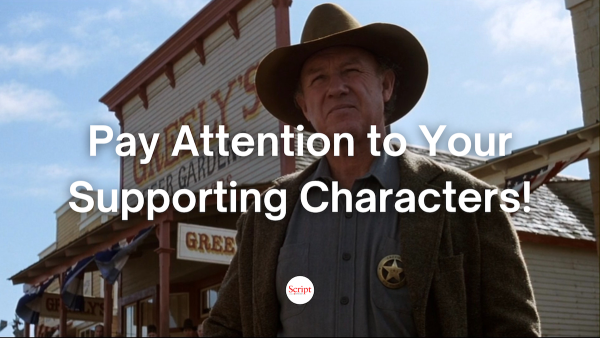Balls of Steel™: The Zig-Zag Screenwriting Career Path
Your screenwriting career path will always be unique, twisted, and unpredictable. Jeanne Veillette Bowerman gives advice on how to survive it.
Jeanne Veillette Bowerman is the Editor of Script Magazine and a screenwriter, having written the narrative adaptation of the Pulitzer Prize-winning book, Slavery by Another Name, which was honored in the Top 25 Tracking Board Launch Pad Features Competition. She's also the co-founder of the popular Twitter screenwriting chat, #scriptchat. Follow Jeanne on Twitter @jeannevb.
I’ve been pondering life and career choices lately. Perhaps it’s because my own daughter just graduated high school and is college bound. I had a conversation with another recent grad, interested in writing, asking my advice. I’m not sure he was ready for my brutal honesty.
Welcome to the real world.
In school, we take tests, being taught there’s only one right answer to a question. If we give it correctly, we get gold stars. We sit with our guidance counselors mapping out our life and the steps we need to take in order to succeed in our careers.
A perfect plan.
Get ready because your perfect plan will blow up in your face.
We all write, in part, to see our work in movie theaters, film festivals, or online. We’re raised to believe if we just keep making forward movement, our path to success will rise in direct proportion to the efforts we put in.
Not in Hollywood.
There’s no guidance counselor good enough to prepare anyone for the winding road to success as a screenwriter. More often than not, that road leads us straight to a dead end.
The truth is, there is no clear path to success in this industry. It twists, turns and winds, sometimes even backwards, all before any forward motion. The reality is, most people quit long before any real progress happens.
Progress? What’s that?
The first step to surviving Hollywood is defining the word “progress.” Progress doesn’t mean you have achieved success, simply that you are on the path to success.
Using that definition, progress can be found in a variety of things one might otherwise consider to be failure:
1. A pitch meeting that leads nowhere. How is that progress? Simple. You met with someone you may never had met with before who now is aware you exist and the types of ideas you are turning into stories. As long as you impressed the exec in some way, instilling in her your charm and wit, makes you someone she’d want to work with one day. That is progress.
2. An exec read your script and passed. Congratulations! You got someone to read your work. That, my dear writer, is progress.
3. You submitted your script before it was ready. Breathe. You blew that shot at a first impression. You learned a critical lesson. Don’t ever forget it. Now shake it off and do the work right next time. Learning lessons is progress.
4. The exec asked, “What else you got?”… and you got squat. That means you need to sit your ass in the seat more often and do the work. You are trying to prove you are a writer. Then WRITE! No one wants a one-trick pony. Create a writing schedule that is realistic and stick to it. Writing every single day, even if only for 15 minutes, is progress.
Believe me, I have made my share of mistakes on my journey. I even wrote a letter to my newbie screenwriter self, giving advice I wish someone had given me in Dear New Screenwriter. If only I could turn back the hands of time.
But we can’t. Instead, we need to keep searching for our unique path, finding answers along the way. Some good. Some not so good. When life hits you hard with a sledgehammer, don’t lay on the ground licking your wounds, learn from them. That is progress... and evolution.
Answers aren’t always clear, like a shiny gold star. Sometimes they’re cloudy, and we can’t see through them to fully understand what we’re supposed to do. But in time, when you have a little more experience or knowledge, the answers can become clear.
After you’ve pitched a dozen more execs, that thing an exec said to you in a pitch meeting two years ago may all of a sudden make sense.
When you write your next script, you might suddenly understand why the exec passed on your last one. Or you might realize that a beat sheet doesn’t work as well for you as writing sequences. You need to write in order to learn what techniques fit your writing style and voice.
The only way you can gain clarity is to try to keep it all in perspective by analyzing your past performances and learning from them.
Success is a not a straight line. It’s a zig-zag path, moving sideways, backwards, forwards, and even in circles, spinning you around and around until you want to throw up.
You’ll drive yourself crazy trying to make logic out of a situation where there is no logic. Hollywood is just that – insane.
The entertainment industry is not at all like any other business model you’ve seen. If being a screenwriter is what you truly want to do, get ready for a wild ride.
The only way to survive it is not to give up. As long as you wake up each day with the intention to do the work on your craft, to learn something new about the industry, and to sit your ass in the chair and write, you can survive.
At my niece’s 5th grade Moving Up Ceremony, the principal recited from Oh, the Places You’ll Go! by Dr. Seuss. This excerpt reminded me of my journey as a screenwriter:
I'm afraid that some times
you'll play lonely games too.
Games you can't win
'cause you'll play against you.
All Alone!
Whether you like it or not,
Alone will be something
you'll be quite a lot.
And when you're alone, there's a very good chance
you'll meet things that scare you right out of your pants.
There are some, down the road between hither and yon,
that can scare you so much you won't want to go on.
But on you will go
though the weather be foul
On you will go
though your enemies prowl
On you will go
though the Hakken-Kraks howl
Onward up many
a frightening creek,
though your arms may get sore
and your sneakers may leak.
On and on you will hike
and I know you'll hike far
and face up to your problems
whatever they are.
You'll get mixed up, of course,
as you already know.
You'll get mixed up
with many strange birds as you go.
So be sure when you step.
Step with care and great tact
and remember that Life's
a Great Balancing Act.
Just never forget to be dexterous and deft.
And never mix up your right foot with your left.
And will you succeed?
Yes! You will, indeed!
(98 and 3 / 4 percent guaranteed.)
Yep. That Dr. Seuss knew a thing or two about the zig-zag path of a writer’s life.
Watch ScriptMag Editor Share Her Advice on Facing Your Writing Fears
Jeanne Veillette Bowerman shares her personal story of facing her fears in order to propel her writing and her career. Click on the image below to watch Jeanne's advice.
Jeanne Veillette Bowerman is a Senior Executive at Pipeline Media Group and Book Pipeline, Editor-in-Chief of Pipeline Artists, Director of Symposium—a year-round conference in the arts, co-host "Reckless Creatives" podcast, partner at Fringe Press, former Editor-in-Chief of Script magazine and a former Senior Editor at Writer's Digest. Recognized as one of the "Top 10 Most Influential Screenwriting Bloggers," her "Balls of Steel" column was selected as recommended reading by Universal Writers Program. A compilation of her articles is now available at The Writers Store—Balls of Steel: The Screenwriter's Mindset. She is also Co-Founder and moderator of X's weekly screenwriters’ chat, #Scriptchat, and wrote the narrative adaptation of the Pulitzer Prize-winning book, Slavery by Another Name, with its author, Douglas A. Blackmon, former senior national correspondent of The Wall Street Journal. More information can be found on her website. X: @jeannevb | IG/Threads: @jeannevb_ | BlueSky: @jeannevb.bsky.social







